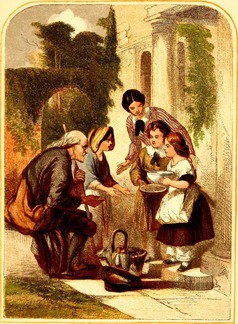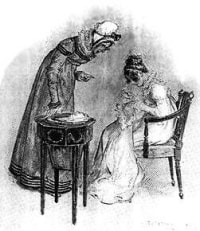|
"Here begins the village. Those cottages are really a disgrace. The church spire is reckoned remarkably handsome... Those are almshouses, built by some of the family."
-- Maria Bertram pointing out the features of the village next to Sotherton in Mansfield Park |

In Secrets Made Public (1808), Ellen, the foundling/ward of benevolent Sir Octavius, is “the constant companion of his charitable excursions, and her sensibility was spoken by the tear that glittered in her eye, as the infant to whom she gave bread lisped its little prayer of thanks, or the white-headed old man crossed his hands on his breast, and, looking to the heavens, breathed a silent blessing on his benefactor.”
In The Spinster's Tale (1801), Lady Brumpton is held up as an example of noblesse oblige: “This most worthy woman’s delight is, to render her dependents happy, and they in return make her so by fidelity and honesty… the poor look on her as their earthly benefactress, the aged as their constant friend, and infancy as its preserver, for the lisping tongue of innocence is ever blessing the lady of Brumpton Castle.—Every woman of rank and fortune might be equally beneficial to her fellow mortals, for great is the blessing of riches, if properly applied.”
In Geraldine, or Modes of Faith & Practice (1820), the heroine recollects the happy days when she used to visit the cottagers with her late mother: “The labourers, returning with slow and wearied step from their daily toil, had quickened their pace, at her approach, and bowed in silent gratitude to their benefactress. The little children had ceased their sports on the green, and ran to claim a smile from the kind lady. The ‘busy housewife’ had left her wheel, to drop a courtesy, and call down blessings upon her.”
The hero of The Denial (1792) helps a destitute gentlewoman and her children. “After a silence of some seconds, she said, “This charitable donation will confer happiness and plenty, blessings to which I have long been a stranger. Accept the thanks of a grateful heart, and as soon as my little-ones can lisp your name, I will teach them to bless that hand which hath so liberally contributed to the relief of their misery.”
The History of Lady Julia Mandeville, (1792), relates how “Lord Belmont enjoys the most unmixed and lively of all human pleasures, that of making others happy… every eye shines with transport at his sight; parents point him out to their children; the first accents of prattling infancy are taught to lisp his honoured name; and age, supported by his bounteous hand, pours out the fervent prayer to Heaven for its benefactor.”
I think I'm seeing a pattern here...
 The Blind Beggar of Bednall Green, detail, Owen/Ward, British Museum
The Blind Beggar of Bednall Green, detail, Owen/Ward, British Museum
Being charitable was one of the few ways a gentlewoman could show agency, when you think about it. They were not supposed to travel on their own or work at a job. Mrs. Stanley, the mother of the heroine in Coelebs in Search of a Wife, tells Charles (“Coelebs”) “I have often heard it regretted that ladies have no stated employment, no profession. It is a mistake. Charity is the calling of a lady; the care of the poor is her profession.”
In Celia in Search of a Husband, (1809) the heroine resolves to go to the aid of a girl who has been seduced and abandoned and is dying alone, despite the strong social sanctions against an unmarried girl like Celia having anything to do with a "fallen woman." She resolves to herself, mentally addressing the wronged Jessy: "“I will steal an hour, and visit your deserted abode, though a thousand fingers should be pointed at me—I feel I cannot be wrong in doing so, and I believe I have the power to give you some comfort.” – With these feelings the benevolent Celia retired, Charity soothing her slumbers…”
Fanny and Elizabeth, the dual heroines of Elizabeth Helme's Modern Times (1814) use some of their riches to set up a school and a medical clinic in the village near their stately home.
The heroines of The Bristol Heiress (1809) and A Winter in Town (1809) come to the aid of people injured in carriage accidents. Seraphina in A Winter in Town meets resistance from her servants, who warn her that the woman lying in the street with a broken leg is probably a street walker who ought not to be taken into her carriage. Both heroines insist on doing the right thing.
The heroines often receive an unlooked-for reward for their benevolence. Both Seraphina and Coraly are rescued from evil abductors by people who feel indebted to the heroines for some previous act of kindness. Thus the charitable action not only establishes the heroine's innate goodness, it comes in handy for plot purposes.
 Mrs. Norris berates Fanny
Mrs. Norris berates Fanny
For authors of the long 18th century, charity to the poor is one of the duties of the landed gentry. Austen mentions this duty, but mentions it only in passing in some of her novels. Mr. Darcy is good to the poor, Sir Walter Elliot isn’t. The Rushworths built alms-houses (low-income housing) on their property. Henry Crawford senses that the best way to recommend himself to Fanny Price is to present himself as "the friend of the poor and the oppressed."
We can compare this brevity to the more heavy-handed moralizing of other authors. The Bristol Heiress concludes with a commendation of the heroine's husband: "Lord Castleton [learned] that to rank and fortune numerous and important duties are annexed, and that happiness consists chiefly in the discharge of them—that a useless life is a life of misery and sorrow; he was therefore, regularly employed in some pursuit, which might be serviceable to his domestics, to his tenantry, to his friends, or his country…. the interests of his tenantry he promoted, by recommending the improvements of agriculture, equally beneficial to them and to the country, and assisting, in various ways, the practical application of them. His domestics he rendered happy, by establishing order and regularity amongst them…”
Albert, or the Wilds of Strathnavern frequently raises the topic of our duties to the lower classes. Young Frederic praises his aunt Stanhope to his mother, “everyone seems to love her; the old folks look so grateful and happy, and the children skip with such pleasure when they see her coming, that I wish with all my heart you would adopt the same method with our poor people in Yorkshire.
“Indeed I shall do no such thing,” [his mother answers]. "Does not the parish provide plentifully for the poor?”
Later in the novel, Mrs. Stanhope plans to buy the neighbouring estate to help its tenants: “The house,” said she, “I have no occasion for, though it is in perfect repair; nor should I have thought of the land, but that the poor people who are resident on the estate have been ground by extortion to the earth; and have pressed me so very warmly if possible to become the purchaser, that though I had rather be excused, yet I do not like to refuse.”
In Consequences, or Adventures at Castle Rraxall (1796), the old family tutor (who roves around the estate like a Scottish Savanorola), upbraids the daughter of the house: “Twenty revolving summers have I sojourned in this village, and my remembrance fails me much, if any act of generosity has e’er been coupled with the name of Lady Charlotte Rraxall. –I have heard no sick man’s prayers, nor poor man’s blessings for anguish softened, or for food supplied by Lady Charlotte’s bounty—No little children lisp her name with gratitude, or send their artless orisons to Heaven for blessings on her head!—But I have viewed her in the maze of folly, dancing the same mad round, for many a precious, past, irrevocable hour…”
 Acts of Kindness -- Frank Churchill mends Mrs. Bates's spectacles
Acts of Kindness -- Frank Churchill mends Mrs. Bates's spectacles
In “Learning the Art of Charity,” in Jane Austen’s Philosophy of the Virtues, Sarah Emsley discusses Emma Woodhouse’s uncharitable rudeness toward Miss Bates, and her generous sharing of food with Miss Bates and her mother. Here, Emsley is defining “charity” broadly.
To be fair, though what charitable acts could Emsley reference in Austen's novels? There are few examples in her books to study. Are any of Austen's heroines shown as being charitable apart from Emma? We are told Marianne Dashwood becomes the patroness of the village after her marriage, but we aren't shown heroines in action. Does Anne Elliot take a boy run over by a horse into her carriage? Does Elinor Dashwood teach the lisping village children how to read? Does Elizabeth Bennet call in at the hovels of the poor on her walks to Meryton? No? Does this mean that there are no poor cottagers in Meryton, or does this mean the readers of the day assumed that Elizabeth helped the poor as a matter of course, or does it mean something else?
Not only are Austen's heroines not charitable, she mocks her female fools/villains who are charitable: One character who talks about helping the poor is, paradoxically, Mrs. Norris in Mansfield Park: “Why cannot you come and sit here, and employ yourself as we do? If you have no work of your own, I can supply you from the poor basket. There is all the new calico, that was bought last week, not touched yet. I am sure I almost broke my back by cutting it out. You should learn to think of other people...”
Another Lady Bountiful--Lady Catherine de Bourgh--is held up to ridicule: "whenever any of the cottagers were disposed to be quarrelsome, discontented, or too poor, she sallied forth into the village to settle their differences, silence their complaints, and scold them into harmony and plenty." No lisping or blessing tenants here!
Austen could even laugh at the suffering heroine who needs charity herself. In her 'Plan of a novel," a short satiric piece written the year before her death, she makes fun of sentimental novels by proposing a heroine "often reduced to support herself and her Father by her Talents and work for her Bread; continually cheated and defrauded of her hire, worn down to a Skeleton, and now and then starved to death."
 The Cheerful Giver, or Little Lady Bountiful, Frederic Morgan
The Cheerful Giver, or Little Lady Bountiful, Frederic Morgan
The heroine Coraly, quoted in the previous post, says: “It is dreadful to my feelings…. to see the mixture of profusion and luxury, of want and misery, which in the same moment meet your eye in this town! Could but a little be spared from the one, and given to the other, how much would the picture be improved?”
Coraly's call for income redistribution goes much farther than Jane Austen ever did in condemning the luxuries of the rich and publicizing the sufferings of the poor. Nevertheless some scholars maintain that Austen was radical and progressive in her views. This theory is of recent origin. Leslie Stephen, a prominent Victorian-era critic, accused her of complacency: “She is absolutely at peace with her most comfortable world. She never even hints at a suspicion that squires and parsons of the English type are not an essential part of the order of things; if she touches upon poverty, the only reflection suggested is one of gentle scorn for people who can’t keep a butler themselves or take tea with people who do so. When the amiable Fanny Price in Mansfield Park finds that her mother has to eat cold mutton and mend the children’s clothes, her only thought is to return to her rich uncle. The harsh hideous facts with which ninety-nine out of a hundred of our fellow-creatures are constantly struggling, are never admitted into this delightful world of well-warmed country houses.”
I think that’s going too far the other way. I have my own theory about why Austen does not use charity as a topic. It is not about Austen’s personal convictions as a humanitarian, but her artistic choices. I think Austen, as a writer, felt her voice could not sing in a sentimental register. None of her heroines make a parade of their virtue. She rejected as a threadbare cliché the idea of presenting any of her heroines bestowing the tender smile of benevolence on the artless lisping urchins in their habitation of misfortune and want. Her remarks in Emma make it clear that she recoiled from the sentimental portrayals of the poor old cottagers blessing their benefactors.
|
"Emma was very compassionate; and the distresses of the poor were as sure of relief from her personal attention and kindness, her counsel and her patience, as from her purse. She understood their ways, could allow for their ignorance and their temptations, had no romantic expectations of extraordinary virtue from those for whom education had done so little; entered into their troubles with ready sympathy, and always gave her assistance with as much intelligence as good-will."
|
|
In my earlier post on poverty, I also talked about the gypsies in Emma, who are not treated sympathetically, despite their poverty.
A reminder that during Austen’s lifetime, humanity began its steep climb into prosperity, in amazing contrast to the centuries of hardship that had preceded our modern era. I believe that Austen read Albert, or the Wilds of Strathnavern, (quoted above) because one of its main characters appears to be a prototype of Persuasion's Admiral Croft, and it uses the device of private theatricals. More about that here. In A Different Kind of Woman, the final volume of my Mansfield Trilogy, Fanny Price organizes abazaar, a way for women to sell their wares without the expense of opening their own shops. For more about my writing,click here. Emsley, Sarah. Jane Austen’s Philosophy of the Virtues. Palgrave Macmillan US, 2005 Stephen, Leslie, 'Humour', Cornhill Magazine 33 (1876), pp. 324–5.
Previous post: Charity in country and town Next post: Celia,the smiling heroine
|

 RSS Feed
RSS Feed